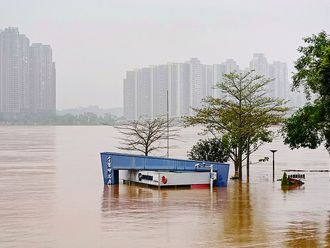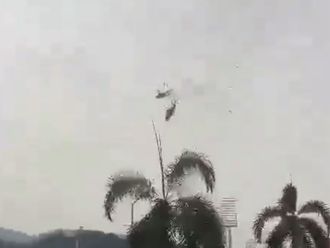Colombo: Tamil Tiger leader Velupillai Prabhakaran lives more than 40 feet under ground in a massive, well provided, and seemingly impenetrable bunker complex hewn from rocks in the middle of a thick jungle in northeast Sri Lanka.
Adele Balasingham, the Australian-born wife of the late Anton Balasingham, ideologue of the Liberation Tigers of Tamil Ealam (LTTE), describes Prabhakaran's office-cum-residence in the Alampil jungles, in her book The Will to Freedom.
"Our cadres led us down the steps into a room about 30 to 40 feet underground. To our amazement, we could see that this subterranean haven of tunnels and rooms had been chiselled out of the underground rocks. Our room had been carved out, high enough to stand up in and move around comfortably."
"Mr Prabhakaran's room was even deeper underground than ours," she writes.
"Low lying roofs constructed over the bunkers, and banks to divert water, prevented the monsoon rains from pouring in and flooding the bunkers."
"Stronger than concrete, this underground granite structure stood up to the heavy downpour of the monsoon rains when the entire jungle turned into a muddy quagmire."
"Since we were deep into the earth, where the sun's heat has no access, the room was absolutely freezing, particularly at night. My bones ached from the cold and I wondered how it could be endured over a sustained period of time. But obviously it had been, and without any ill-effects," she notes.
The expansive complex was more like a village than a camp. It had been cleared of virgin jungle. The LTTE's cadres had pulled out rocks and cleared the foliage except the giant trees, which gave it good cover. Sixty to seventy feet wells had been dug, only to find that there was no water!
Since the Indian Peace Keeping Force (IPKF) was on the prowl in the Mullaitivu jungles at that time she was referring to, keeping "Base One Four" supplied with food and other necessities was extremely problematic.
From 1987 to 1990, the IPKF was fighting the LTTE as the latter had refused to comply with the India-Sri Lanka Accord on the ethnic question and lay down arms.
Difficult circumstances
Under these difficult circumstances, the LTTE's cadres in Base One Four had to survive on rice and "dal" (lentil) without salt, Adele says.
The routes of the food suppliers had to be changed frequently to avoid being detected by the IAF's MI-24 choppers and the IPKF's foot patrols. Mines had to be detected and dodged.
Though the camp was visible from the air, and the IAF's choppers could swoop down, the casualties in Base One Four were minimal, Adele notes.












